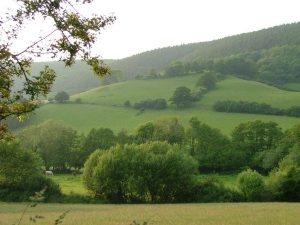[Subtitle] What is the significance of the subtitle?
[First Verse Paragraph]
the speaker is in a “green and silent spot” (1), which he describes as a “quiet spirit-healing nook!” (12); makes him think of the “humble man” who might lie there and compares that man to the “singing sky-lark” (18)
Is the humble man the speaker?
The dell is a unique space of refuge where the “humble man” feels “Sweet influences” (21) and finds “Religious meanings in the forms of Nature!” (24); allows him to dreams of “better worlds” (26)
[Second Verse Paragraph]
Opens with a prayer? A curse? A cry? Of “My God!” (29); note that this is at the transition between the first two verse paragraphs; the “turn”
The possibility of calm interrupted and thoughts (and feelings) of “uproar” and “strife” (34); imagines “Invasion” (36-38)
acknowledges Britain’s guilt; the poem questions whether England has invited such a threat because of its “sins” (39-49); not unlike Anna Barbauld here
England has been plagued by vices including the propagation of slavery (50); bad government; blasphemy; perjury (43>) and greed “bartering freedom and the poor man’s life / For gold, as at a market” (62-63)
Test Acts are a “scheme of perjury” that allows the “owlet Atheism” to emerge (70-86). See this academic site for a brief description of the Test Acts (http://www.historyhome.co.uk/c-eight/l-pool/testacts.htm)
[Third Verse Paragraph]
Coleridge details the ways in which Britain has “swelled the war-whoop” (90) without suffering any cost; a poem not uncritical of Britain; its working as a nation and as a combatant (inciter) of war
Characterizes war as “fratricide” (114) i.e. brothers killing brothers; and received by a nation as though it were a matter of words rather than human bodies and souls (115 and following); writes here that “invasion” will be just retribution possibly from an “all-avenging Providence” (125)
How does the tone here and throughout the poem reflect Coleridge’s training as a minister in the Church of England?
[Fourth Verse Paragraph]
Opens with an address to God asking to be spared; imagines invasion of England in graphic detail; even after acknowledging British error, Coleridge makes space for the brave protection of England in the face of “an impious foe” (139), if done in the spirit of humility rather than triumph (150-154)
[Fifth Verse Paragraph]
Begins with the first-person “I”; describes his own account of the set of false beliefs that dominate British society, in which God’s purposes are being undermined by greed, false morality, and even dangerous notions of revolution
Poem takes a turn at line 160 when Coleridge attempts to vindicate his own position; neither radical (166) or conservative (174)
[Sixth Verse Paragraph]
Describes himself as a true child of England, his “Mother Isle”; nurtured and healed by its natural beauty
the island is the Mother and Coleridge the child of Nature and God; he is a son, a brother, a friend; bound by “natural love” within England
Note significance of anaphora lines 187 through 189; the final two lines of this verse paragraph are particularly important
[Seventh Verse Paragraph]
A notably short verse paragraph; what do you make of this change?
Dismisses “fears / My filial fears” (198) to the wind
[Eighth Verse Paragraph]
In this final section we get the characteristic Romantic movement from interior (and often low-lying spaces) to a position of ascendance; as the speaker looks out over the “society” of trees (215) he is reminded of his own social world and its import (220-225)
he returns to that social world nourished by the “solitary musings” and “conversing” that took place in nature (225>)
Two other points about the poem:
- An ode (addressed to the Nation) written in blank verse; make sure that you understand how an ode differs from a shorter lyric poem
- A characteristic reliance on the power of musing in nature and its consequences; he can be a better Briton as a consequence of his retreat into Nature and his reemergence back to the small village (not London)
